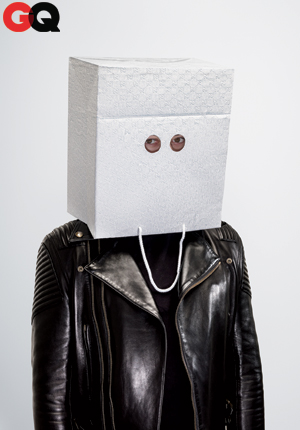 BUZZ BISSINGER: “Was I homosexual because so much of what I wore is associated with gays? I did experiment. And while I don’t think it is my sexual being, I can tell you that gay men as a group are nicer, smarter, have a shitload more fun than straight whites. Was I veering toward becoming a dominant leather master in the S&M scene, the leather fetish an obvious influence in most of the clothing I purchased and in much of high fashion itself? I did experiment. Was I a closeted or maybe not so closeted transvestite? Tom Ford makeup is divine; the right foundation and cheek blush and eyeliner and lipstick can do wonders for the pallid complexion. Thigh-high boots add to any wardrobe, although walking on six-inch stilettos for hours is just a bitch and therefore confined to the privacy of my house, seen only by the UPS man, who at this point could not possibly be surprised by anything. But a dress or skirt just doesn’t look good on me, and I can’t ever do a thing with my hair. The look I was going for was more David Bowie androgynous. […] I had always been attracted to S&M, even at an early age, when I didn’t know what it was. My mother wore leather gloves in springtime. My first teacher in kindergarten, who probably thought I was mentally challenged because I never spoke, also wore leather gloves, and every day as she left I would watch as she slowly put them on with the stretch and pull of the fingers. My eighth-grade math teacher wore stiletto black leather boots and black hair like Elvira and spoke in dismissive clips, and I adored her, even when she dropped test results into my lap with B- circled in red at the top. I did engage in a relationship with a dominatrix after the failure of my second marriage. I left the scene after two years. But I clearly missed it, the trappings of leather increasingly irresistible. I liked extreme feelings of restraint and taking pain. But I was also interested in everything.” MORE
BUZZ BISSINGER: “Was I homosexual because so much of what I wore is associated with gays? I did experiment. And while I don’t think it is my sexual being, I can tell you that gay men as a group are nicer, smarter, have a shitload more fun than straight whites. Was I veering toward becoming a dominant leather master in the S&M scene, the leather fetish an obvious influence in most of the clothing I purchased and in much of high fashion itself? I did experiment. Was I a closeted or maybe not so closeted transvestite? Tom Ford makeup is divine; the right foundation and cheek blush and eyeliner and lipstick can do wonders for the pallid complexion. Thigh-high boots add to any wardrobe, although walking on six-inch stilettos for hours is just a bitch and therefore confined to the privacy of my house, seen only by the UPS man, who at this point could not possibly be surprised by anything. But a dress or skirt just doesn’t look good on me, and I can’t ever do a thing with my hair. The look I was going for was more David Bowie androgynous. […] I had always been attracted to S&M, even at an early age, when I didn’t know what it was. My mother wore leather gloves in springtime. My first teacher in kindergarten, who probably thought I was mentally challenged because I never spoke, also wore leather gloves, and every day as she left I would watch as she slowly put them on with the stretch and pull of the fingers. My eighth-grade math teacher wore stiletto black leather boots and black hair like Elvira and spoke in dismissive clips, and I adored her, even when she dropped test results into my lap with B- circled in red at the top. I did engage in a relationship with a dominatrix after the failure of my second marriage. I left the scene after two years. But I clearly missed it, the trappings of leather increasingly irresistible. I liked extreme feelings of restraint and taking pain. But I was also interested in everything.” MORE
TODAY: Since the release of the essay, Bissinger has checked himself into rehab but has not disclosed the reason. In a statement to NBC News, he said he wrote the essay to help others struggling with addiction, “as well as self-expression and the damage that can be done by denying who you are.” “I wrote it because it was the only way I knew of coming to terms and getting the help I am now getting. I have no regrets about what I wrote but I also have nothing to add. The story speaks for itself.” MORE
